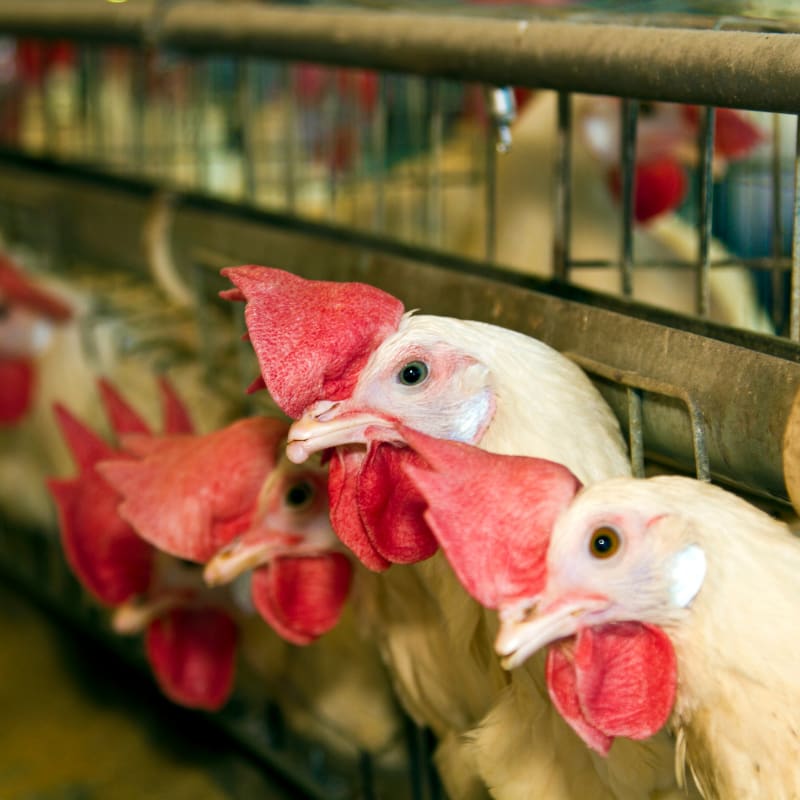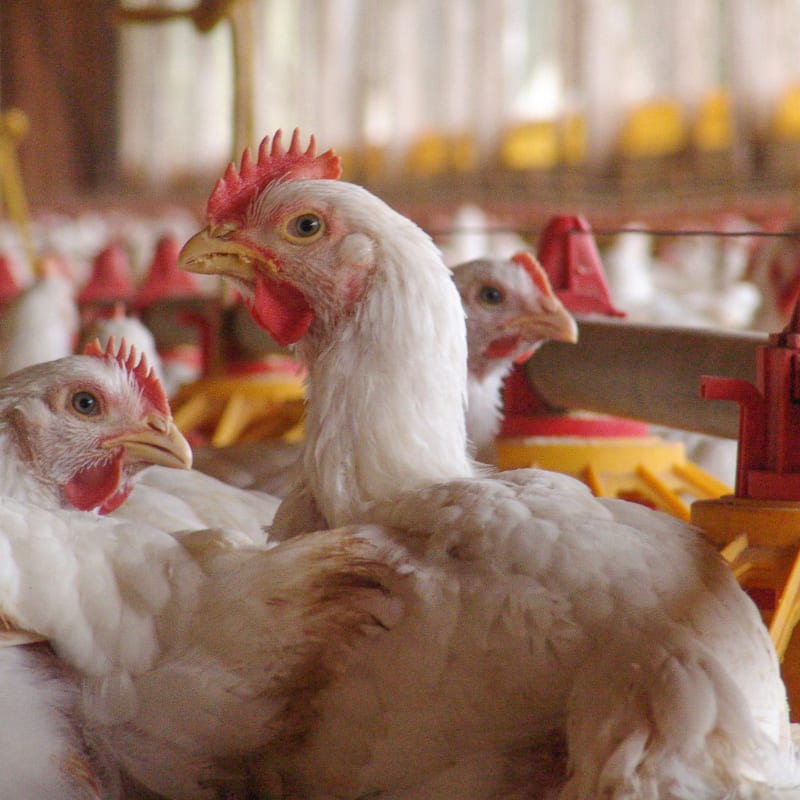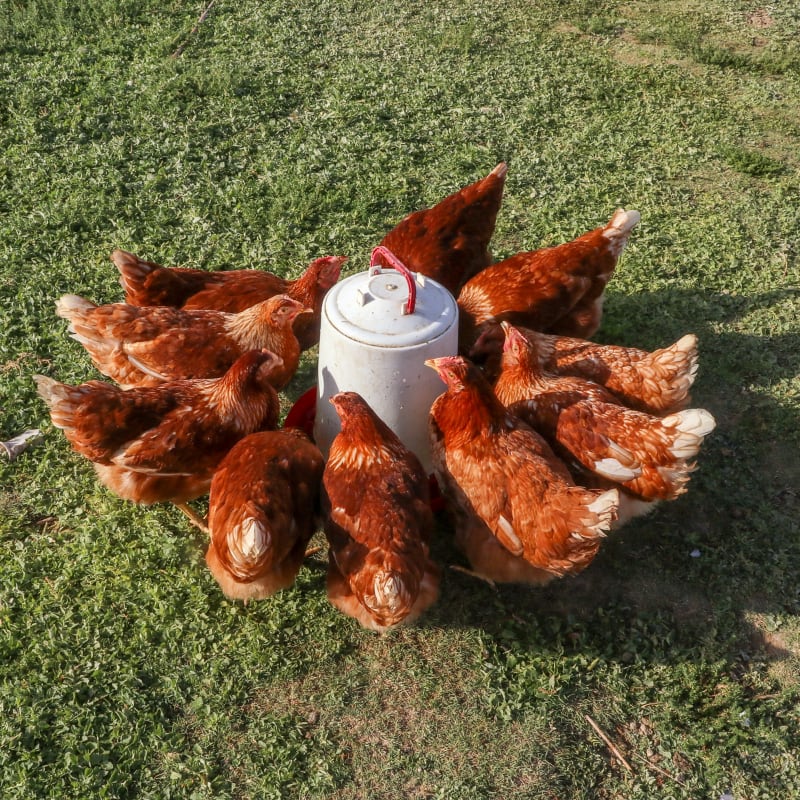It seems simple, but what and how much chickens drink has a huge impact on flock performance of broiler chickens. We’ve talked about several elements that impact chickens’ drinking water, including water’s pH value, flow rate, pressure and quality. For more information about these important factors in chickens’ health, check out our Poultry Biosecurity video resources on YouTube.
We want our chickens to drink fresh water. Feed intake and how much water a chicken drinks are directly connected. Chickens drink approximately one and half to two times as much water as they do feed. When water consumed increases, feed consumed increases as well.
Dr. Tabler from Mississippi State University says that “Water is the most important nutrient for the overall health and performance of commercial broilers.” Although we may not always think of water as a nutrient, it is a huge part of what chickens need to be healthy. Several health issues for chickens can be traced back to the chickens’ water- is there enough water in the waterer? Is the water clean? Could there be sources of water contamination? Do you need any water treatments?
It’s clear to us the impact of water on our human bodies. If we don’t have enough clean water, we can really feel our dehydration throughout our whole body. What’s in the chicken waterer does more than just hydrate your bird. It impacts all major functions of a bird body- digestion, waste secretion, respiration, food softening, joints lubrication and body temperature regulation. If any one of these functions is impaired, chickens will see compounding health problems.
Sometimes, we try to treat chickens’ symptoms without looking at the root issue. If you overlook the basic problems with water quality and consumption, your efforts to make your chickens happier and healthier may be met with little success.
How can you make chickens drink more water?

Start with the basics. What does water consumption look like currently? Although you can’t control the feed you receive, you are in full control of the water your chickens consume. This is a huge deal since clean, fresh water is one of the most important nutrients to keep chickens healthy.
To really increase chickens’ drinking water consumption, you shouldn’t focus on what makes the chicken want to drink water, but what may be stopping them from visiting the chicken waterer. You don’t have to teach your birds to drink water- you just have to provide water! Birds know naturally that drinking water is good for them. They want to drink water. So what is keeping them from visiting the waterer? That’s what we need to focus on to make sure our flock gets enough clean water.
Water Delivery Methods
First of all, a bird can’t drink anything if the chicken waterer is empty. Start from the beginning of their water source.
- What is the capacity of your source? Do you have a well? If so, how many gallons is it pumping?
- Is the motor strong enough, and is it running efficiently?
- What size are the pipes running from the well, or from the county source, to your houses?
- Is there a bottle neck running into the house? You could have 12-inch pipes running to the house and in the house, but if there’s a half-inch pipe at the meter then guess what? A chicken cannot get as much water as it needs.
- What do your filters look like?
- How old is the plumbing?
- Is there any buildup in the lines, reducing pipe diameter?
- Do you have the correct pressure?
Now, you can have all the drinking water capacity in the world, but if you don’t have the supply to match how much water your chickens drink, it won’t matter. Mechanical items like these can be taken care of with a little attention to maintenance or some retrofitting.
What’s in your chicken waterers?
Water quality is another huge factor in how much water a chicken will drink. Assessing what’s in your flock’s water source can be a bit more complex than determining the effectiveness of its delivery method. What does your water smell like? Is your water clear? What is the pH in your waterers? What will it take to get the pH where it should be? Will this pH-changer also drive the flock away from the water?

Dr. Susan Watkins of the University of Arkansas has even suggested that adding an apple cider vinegar to a flock’s waterer can help cover the bad taste of a pH changer. It’s not impossible for the mineral content of a well to change. For example, the manganese content of your water may have been low at one time and be much higher now. Maybe there is a little more iron than you used to have. A basic water test every so often can help you prevent problems with dissolved minerals in your chicken waterer.
Other elements that impact how much a chicken drinks
The University of Georgia has a helpful article on how to best manage water in your poultry house, especially considering environmental factors.
- Lighting in the poultry house
- The house’s temperature
- The water’s temperature
- The addition of electrolytes to the water
- Number of nipples available and their flow rate to the birds
- Paw quality- it may be more important than you think!
Temperature
Hot weather in the summer months causes your flock to drink more water. A chicken manages heat by panting. When they pant, they lose water, which then needs to be replaced to maintain a balanced body. According to the University of Georgia Extension’s article, “Water consumption in broilers increases approximately 7 percent for each degree Fahrenheit increase in temperature.”
Water Temperature
Providing cool water to broilers and layers in the heat of the summer weather is beneficial to the chicken’ s body temperature regulation. However, keeping water cool on its way to a poultry house can be difficult.
Electrolytes
Some growers like to add electrolytes into their waterers since they regulate nerve and muscle function and support normal cell growth. These are especially helpful during periods of heat stress when mortality rates are higher.
Lighting
A chicken typically doesn't consume much water during dark periods, since this is when they rest. However, when a house is dark for more than eight hours, birds will drink water. In houses that use lighting programs, this is usually at dawn and dusk.
Failure to provide waterers with unlimited amounts of fresh water can threaten healthy chickens by negatively impacting feed intake, which even translates to a decrease in egg production. Plan ahead so your flock should have constant access to fresh water and feed to eat.
How much water should chickens drink?
Many growers wonder exactly how much water their chickens should drink per day. The best answer we can give comes from a study done by Dr. Susan Watkins and Dr. G Tabler for the University of Arkansas, published in Avian Advice. Their chart of water per thousand birds can be found on The Poultry Site, which shows that a chicken should steadily drink more with each day it ages. If water consumption does not change over a few days, there may be some cause for concern and you may want to ask yourself:
- Is my drinker line too high or too low?
- Are there air locks in the water system?
- Could a water filter be clogged?
- Have there been any major changes in light, feed or water supplements?
- Are the chickens sick?
- Is the water pressure correct for the chicken’s age?
Just for meat birds?

We’ve been talking primarily about “meat birds,” or broilers, in this article, but this information is equally true for laying hens. A laying hen needs water just like a broiler does, but likely at different amounts during the growth stage. Akinbobola from Livestocking has a good chart for layer hens and broiler flocks side by side. According to his chart, laying hens drink even more on average than a broiler chicken does.
Backyard chicken keepers with free ranging chickens should monitor their chickens’ water too. This blog is focused on commercial conditions for a flock, but we have resources for folks who keep laying chickens in their backyard in our homeowner-focused blog.
We hope you found this blog helpful. Please reach out to us with any questions or suggestions for future topics at allen@southlandorganics.com or 800-608-3755.
Now go get those birds some good water!






